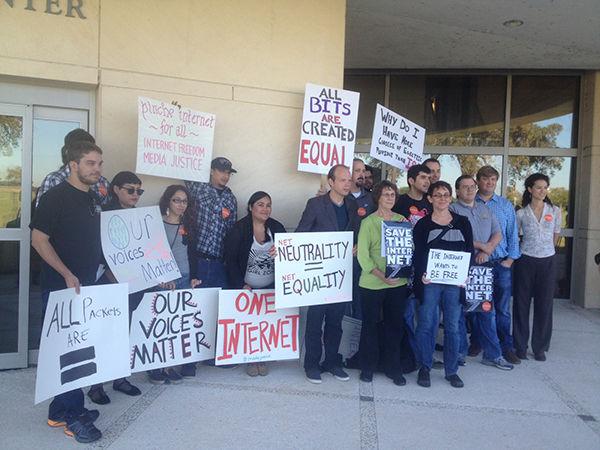With the state of Internet governance in flux, net neutrality supporters marshalled in Aggieland.
Federal Communications Commissioner Ajit Pai held a panel at Texas A&M Tuesday to discuss Internet regulations in what some viewed as a debate about the fate of Internet neutrality — the principle that Internet service providers should be treated equally and not be able to charge different prices based on the user, content, site, platform or other factors.
Members of Free Press, a nonprofit organization in favor of net neutrality, and Common Cause, a nonprofit organization lobbying for an open and accountable government, gathered outside of Hagler Auditorium at the Annenberg Presidential Conference Center before the event to peacefully urge the FCC to push for open Internet protections.
Mary Alice Crim, field director of Free Press, said the protestors were there to make a statement against regulations that might end net neutrality as well as to push for the FCC to instate rules that would protect the open Internet.
“We are concerned to the rights to freely communicate online,” Crim said. “We’re also a little bit concerned about the direction that the Federal Communications Commission, and particularly Chairman Tom Wheeler, is headed in when it comes to this issue.”
Crim said Free Press disagreed with decisions made in the spring by Wheeler and organized the protest because it didn’t consider Pai to be a net neutrality supporter.
“You might have heard in the spring [Wheeler] proposed a plan that would allow for big businesses and companies to create fast
and slow lanes online,” Crim said. “Fast lanes for those who can afford them, slow dirt roads for the rest of us. And that’s something we are really concerned about, we want the chairman to scrap those rules and we want him to protect free speech online.”
Free Press also attended the event because it wanted to let those interested in supporting net neutrality be seen by the FCC outside of where the FCC usually meets, Crim said.
“We wanted to take advantage of the opportunity here because the FCC doesn’t typically get out of the Washington D.C. beltway, so whenever the commissioners do leave we do want to meet with them in person,” Crim said. “We want to make sure we hear what they have to say.”
Although Pai has said he is for the open Internet, Crim said it is not the same open Internet Free Press has in mind.
“What we are watching closely is actions and his actual plans and what he would decide to bring to the table for a vote,” Crim said.
Crim said she approved of Pai bringing in a panel of different speakers who are on opposite sides of the argument.
“We’re definitely all in favor of free speech, and making sure there are more voices at the table, which again kind of comes back to why we were outside here this morning, because we believe that more voices are better,” Crim said.
Todd O’Boyle, program director for Common Cause said the issue is too important to consign to a “cloistered conversation in the Washington D.C. beltway.”
“We hope that the rest of the commission joins Commissioner Pai in future hearings,” O’Boyle said. “That said, we wanted to make sure the viewpoints of the 3.5 million Americans who have contacted the FCC on net neutrality, with the strong message to keep the Internet free, were heard.”
O’Boyle said he agreed with panelists Stewart Youngblood, an entrepreneur advisor who has graduated more than 40 companies in the last four years, and Edward Henigin, an officer at Giganews and the chief technology officer at Data Foundry Inc.
During the forum, both Youngblood and Henigin expressed arguments in favor of ensuring net neutrality by having the FCC re-classify broadband providers as a telecommunications service rather than an information service under Title II of the Communications Act of 1934.
The basis of their arguments is that doing so would allow the FCC to put in place regulations these broadband providers would have to follow to ensure they act in the public interest.
O’Boyle said the other solution being suggested — the suggestion that the FCC use Section 706 of the Telecommunications Act of 1996 to regulate broadband providers so as to “promote competition in the local telecommunications market” and “remove barriers to infrastructure investment” — isn’t specific enough to be the answer and would still lead to paid prioritization which would create fast and slow internet lanes.
“There’s no way to write net neutrality rules under 706. 706 would implicitly require paid prioritization, which is the opposite of Net Neutrality,” O’Boyle said. “And that would be a surrender on years of open Internet policy guarantees of either de facto or de jure policy.”
Six of the people who were outside the forum to support net neutrality were San Antonio residents who drove to College Station without sleeping the night before to attend the event.
“It’s important citizens hear information that isn’t biased,” said Cassaundre Revilla, one of the San Antonio residents. “We didn’t meet each other before, but we all met up to come to this event because we thought it was important.”
The FCC is still taking public comments online regarding the open Internet.
Protestors gather outside the FCC presentation Tuesday.
Photo by Lindsey Gawlik.
Non-profit organizations rally on campus in favor of open Internet
October 21, 2014

Donate to The Battalion
Your donation will support the student journalists of Texas A&M University - College Station. Your contribution will allow us to purchase equipment and cover our annual website hosting costs.



















